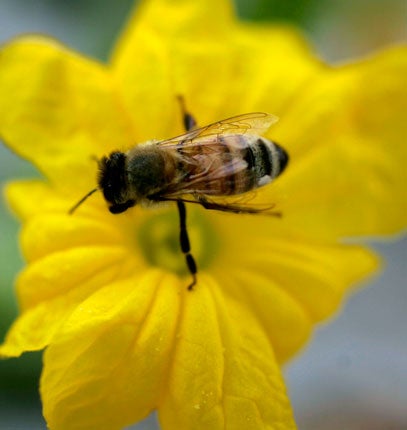Study reveals how bees reject 'toxic' pesticides

Your support helps us to tell the story
From reproductive rights to climate change to Big Tech, The Independent is on the ground when the story is developing. Whether it's investigating the financials of Elon Musk's pro-Trump PAC or producing our latest documentary, 'The A Word', which shines a light on the American women fighting for reproductive rights, we know how important it is to parse out the facts from the messaging.
At such a critical moment in US history, we need reporters on the ground. Your donation allows us to keep sending journalists to speak to both sides of the story.
The Independent is trusted by Americans across the entire political spectrum. And unlike many other quality news outlets, we choose not to lock Americans out of our reporting and analysis with paywalls. We believe quality journalism should be available to everyone, paid for by those who can afford it.
Your support makes all the difference.Bees can detect pesticide residues in the pollen they bring back to the hive and try to isolate it from the rest of the colony, the American government's leading bee scientist revealed in London yesterday.
They "entomb" the contaminated pollen in cells which are sealed over, so they cannot be used for food, said Dr Jeffrey Pettis, head of the Bee Research Laboratory of the US Department of Agriculture.
Yet pesticides are not the only major factor involved in the declining health of bees, Dr Pettis told MPs. He also highlighted poor nutrition and disease, and how these interact. Great interest has been shown in Dr Pettis's work on how a new generation of pesticides, the neonicotinoids, which are increasingly used over enormous acreages of crops in Britain and the US, and may be contributing to the worldwide decline in honey bees by making them more susceptible to disease.
Dr Pettis has discovered that bees infected with microscopic doses of imidacloprid, the best-selling neonicotinoid made by the German agribusiness giant Bayer, are far more susceptible to infection by the harmful nosema parasite.
Yet his study, which featured on the front page of The Independent two months ago, remains unpublished two years after it was completed.
In London yesterday, Dr Pettis, who addressed the All-Party Parliamentary Group on Science & Technology in Agriculture at Westminster, denied that there had been any pressure on him to keep his results unpublished. He said his study was going through the process of peer-review with a scientific journal, and he hoped it would be published shortly, perhaps in less than a month. "In fact, the US Department of Agriculture has given me freedom to talk about it," he said.
And he went on to stress how he felt that, although pesticides were an important issue in bee health – for instance, the recently-discovered case of bees "entombing" pesticide-contaminated pollen – they were not "the dominant factor".
The context of his remarks is that a growing number of beekeepers and environmentalists take the opposite view, and feel that pesticides in general, and neonicotinoids in particular, may well be the key reason for the alarming declines in pollinating insects being seen around the world, with the worst examples being cases of the so-called "colony collapse disorder" first recorded in the US.
The principal concern about neonicotinoids is that they are "systemic" pesticides, which means that they are taken up into every part of the plant treated with them, including the pollen and nectar, so bees and other pollinating insects can absorb them and carry them back to their hives or nests – even if they are not the insecticide's target species.
But Dr Pettis said: "We can't just point to any one single factor as being the dominant thing in the decline in honey bee health. Of late, it seems that this has been the dominant issue, that pesticides are driving everything in bee health.
"I think there's more of what I call the 3-P principle – poor nutrition, pesticides and pathogens. Those three things are interacting greatly. Nutrition is the foundation of good bee health, and certainly there's some pesticide exposure going on, but it varies widely over time and space. And the pathogens in my opinion are often acting secondarily. But it's the interaction of these three [that matters]. You get three of them lined up and surely you'll have bees in poor health. Even the combination of any two could be problematic."
Asked if he thought a precautionary approach – meaning perhaps a ban – should be taken with some of the new pesticides, he said: "I'm not a regulatory person so I hate to speak to 'what should be done'. My own view is that pesticides are one of the issues confronting pollinators, but not the driving issue."
Dr Pettis discovered the ability of bees to sense the presence of pesticide in pollen, and to isolate it in the colony, in a study with another leading US bee researcher, Dennis van Engelsdorp, of Penn State University. They found that the bees had detected fungicide, and two insecticides used to kill parasitic mites in the hive, and sealed it off in cells using a sticky resin called propolis.
Join our commenting forum
Join thought-provoking conversations, follow other Independent readers and see their replies
Comments